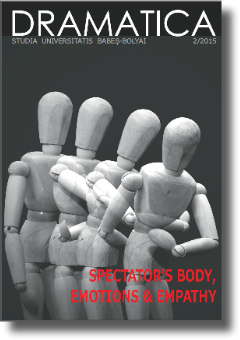TOWARDS EMBODIED SPECTATORSHIP
TOWARDS EMBODIED SPECTATORSHIP
Author(s): Ramunė BalevičiūtėSubject(s): Theatre, Dance, Performing Arts
Published by: Studia Universitatis Babes-Bolyai
Keywords: cognitive approach; audience; spectatorship; emotion; empathy; affect; embodied acting.
Summary/Abstract: The article discusses the cognitive approach to spectatorship. There are different aspects that interest theatre scholars in the field of spectating research, for example, how audiences perceive the process of acting, how emotions and empathy work, and how spectators create meanings. The main premise for the cognitive approach to spectating is that the engagement of the audience in the performance is foremost corporeal. The article analyses the roots of this standpoint and poses a question concerning the possibility of measuring the impact of theatre. Further, the statement that for spectators the most significant engagement with a performance is emotional is considered. The concept of empathy and kinaesthetic empathy in particular is discussed. The article suggests that the crucial specification for successful audiences’ embodiment is embodied acting and trained body-mind that in fact means coherence within and between the mental and emotional systems. Proposing that most reliable data about the effect of the performance is medical examination, this article introduces the research Thinking Body: Acting Systems’ Analysis and Integration in the Process of the Work of a Contemporary Actor which was implemented at the Lithuanian Academy of Music and Theatre in 2013 –2014. The article suggests that interdisciplinary research with the collaboration of theatre scholars and artists as well as specialists of medicine would help estimate what conditions are most favourable for effective communication between performers and spectators.
Journal: Studia Universitatis Babes-Bolyai - Dramatica
- Issue Year: 2015
- Issue No: 2
- Page Range: 161-172
- Page Count: 12

